THE LIVING TAO : TIMELESS WISDOM FOR THE MODERN WORLD
This is a podcast dedicated to exploring the profound, yet elusive True Tao (真道). Acknowledging that the essence of Tao is beyond traditional discourse and expression, this series seeks to demystify Taoist principles and adapt them for contemporary listeners. Each episode offers a blend of ancient wisdom and modern insights, providing practical guidance for navigating the complexities of today’s world. Whether you’re a seasoned practitioner or new to the path, join us in discovering how the timeless wisdom of Tao can be lived out in the here and now.
Episodes
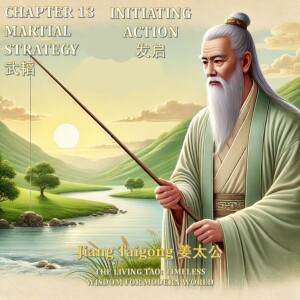
Saturday Dec 07, 2024
Saturday Dec 07, 2024
This Podcast presents excerpts from Chapter 13 of The Art of War by Jiang Taigong, focusing on initiating military action. It emphasizes the importance of observing both heavenly and human principles to understand the enemy's intentions and achieve victory without direct conflict. The passage details strategies for subtly influencing events, highlighting the benefits of benefiting the people and the country rather than exploiting them. Jiang Taigong argues that the downfall of the Yin Shang dynasty is evident in its corruption and social decay, contrasting this with the virtuous path to leadership. Finally, the text emphasizes the subtle nature of true wisdom and effective strategy.
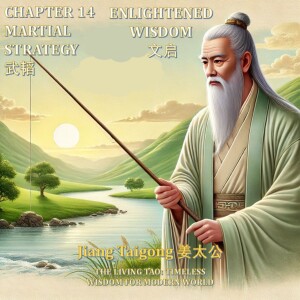
Saturday Dec 07, 2024
Saturday Dec 07, 2024
This Chapter is a dialogue between King Wen and Jiang Taigong, exploring the principles of sage leadership. Jiang Taigong emphasizes the importance of natural harmony, minimal intervention in governance, and aligning actions with the natural order. He uses metaphors like water and the cyclical nature of time to illustrate his points. The conversation highlights the contrast between sage-like rulers who foster tranquility and foolish rulers who cause conflict. Ultimately, the discussion centers on achieving societal stability and prosperity through wise and unobtrusive leadership.
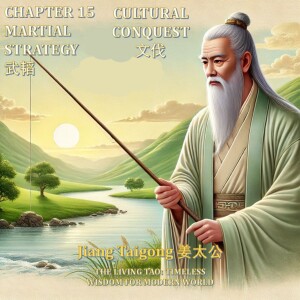
Saturday Dec 07, 2024
Saturday Dec 07, 2024
This Podcast presents Jiang Taigong's twelve strategies for achieving cultural conquest, as recounted in a dialogue with King Wen. These strategies, detailed in the Art of War, focus on manipulating an enemy's internal affairs through bribery, deception, and the exploitation of weaknesses. The goal is to destabilize the opponent from within, rendering them vulnerable without resorting to direct military confrontation. Success hinges on understanding and exploiting human nature, using psychological warfare to achieve political dominance. The text emphasizes the importance of careful observation and planning before initiating any action.
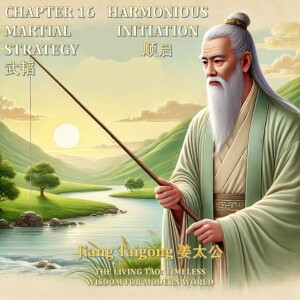
Saturday Dec 07, 2024
Saturday Dec 07, 2024
This Podcast presents a dialogue from the Art of War between King Wen and Jiang Taigong, exploring the principles of effective governance. Jiang Taigong emphasizes six key virtues: vastness, trustworthiness, benevolence, grace, authority, and decisiveness, arguing that possessing these qualities enables one to govern justly. He further explains that actions benefiting the people garner support, while harmful actions lead to rejection. The ultimate goal, according to Taigong, is governing not for personal gain but for the betterment of all under heaven. The passage is presented in both classical Chinese and a modern English translation.
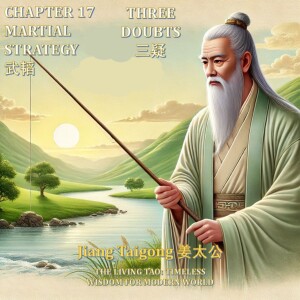
Saturday Dec 07, 2024
Saturday Dec 07, 2024
King Wu of Zhou sought advice from Jiang Taigong on conquering powerful enemies, alienating family members, and dispersing opposing groups. Jiang Taigong's strategy emphasized strategic resource allocation and manipulation of psychology. He proposed strengthening enemies to induce their downfall, using loved ones to isolate targets, and assembling larger groups to dissolve smaller ones. The overarching approach involved careful planning, secrecy, and the strategic use of wealth and rewards to achieve dominance. Ultimately, gaining the favor of the populace through generosity was deemed crucial to success.
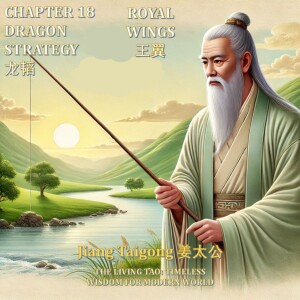
Saturday Dec 07, 2024
Saturday Dec 07, 2024
The Podcast presents a dialogue between King Wu and Jiang Taigong, detailing the ideal organizational structure of a military force. Jiang Taigong outlines seventy-two distinct roles, ranging from strategic planning and logistical support to intelligence gathering and public relations. This intricate structure emphasizes the importance of diverse expertise and adaptability in achieving military success. The roles are meticulously categorized to ensure a harmonious and effective functioning army. The text highlights the need for both practical skills and insightful understanding of celestial and human elements. Finally, the text underscores the crucial role of a wise ruler in overseeing this complex system.
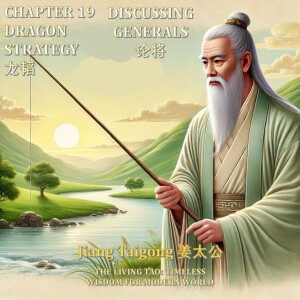
Saturday Dec 07, 2024
Saturday Dec 07, 2024
This Chapter is a dialogue from The Art of War between King Wu and Jiang Taigong, focusing on the crucial qualities of a military general. Jiang Taigong details five essential virtues—bravery, wisdom, benevolence, trustworthiness, and loyalty—and ten critical flaws a general must avoid. The conversation highlights the immense responsibility of a general, emphasizing the importance of careful selection to ensure a nation's survival. The text underscores that a general's actions directly impact a nation's fate in war, with success or failure heavily dependent on their character and capabilities. The importance of selecting the right general is paramount.
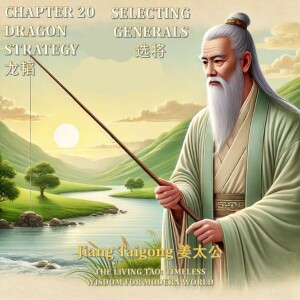
Saturday Dec 07, 2024
Saturday Dec 07, 2024
This Chapter from The Art of War detail a conversation between King Wu and Jiang Taigong on selecting capable military leaders. Jiang Taigong identifies fifteen deceptive outward appearances that mask true character, highlighting the disconnect between a person's presentation and their inner nature. He then outlines eight methods to assess a candidate's true character, involving tests of their responses, adaptability, honesty, virtue, integrity, fidelity, courage, and behavior under the influence of alcohol. The passage emphasizes the importance of discerning true ability, rather than relying on superficial impressions, in choosing effective military commanders. The text is presented in both English and Chinese.
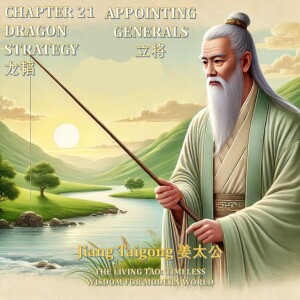
Saturday Dec 07, 2024
Saturday Dec 07, 2024
This Chapter details a formal ancient Chinese ceremony for appointing a military general. King Wu consults Jiang Taigong, who outlines a ritual involving a royal decree, divination, and the presentation of battle-axes, symbolizing the general's absolute authority. The ceremony emphasizes the general's complete devotion to the mission and the importance of unity and decisiveness in battle. The appointed general pledges unwavering loyalty and accepts full responsibility for victory or death. Finally, the text highlights the societal benefits of a successful military campaign.
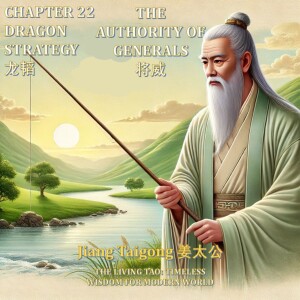
Saturday Dec 07, 2024
Saturday Dec 07, 2024
This Chapter is a dialogue from The Art of War by Jiang Taigong, where King Wu seeks to understand how generals maintain authority. Jiang Taigong explains that a general's power rests on a balance of strict punishments for serious offenses and generous rewards for even minor achievements. This approach, he argues, ensures clarity in commands and obedience, achieved by punishing high-ranking offenders to demonstrate severity and rewarding low-ranking individuals to boost morale. The passage emphasizes the importance of both discipline and benevolence in effective military leadership. The Chinese text provides the original text of the dialogue.

The Living Tao
Welcome to The Living Tao: Timeless Wisdom for the Modern World—your guide to living a life of balance, wisdom, and inner peace. Inspired by the profound teachings of ancient masters, this podcast explores the enduring relevance of these timeless insights in today’s fast-paced world.
Taoist teachings emphasize living in harmony with the natural flow of life—the Tao, or "the Way." This philosophy invites us to embrace simplicity, cultivate humility, and find peace by aligning ourselves with the rhythms of the universe. At its heart, Taoism encourages us to let go of resistance, shed the distractions of ego, and discover the profound serenity that comes from living authentically and in tune with our true nature.
The Tao Te Ching, attributed to Laozi, is one of the most influential texts in Taoism and serves as a cornerstone of our discussions. Its poetic verses guide us to reflect on themes like balance, self-awareness, and effortless action, or wu wei. These teachings are not bound by time or culture—they resonate just as powerfully today, offering insights that help us navigate the complexities of modern life with grace and equanimity.
Each episode of The Living Tao will uncover practical wisdom rooted in these ancient teachings, presenting it in ways that are both accessible and transformative. Whether it's understanding the art of stillness in a world of constant movement, finding clarity amid chaos, or exploring the paradoxes of strength through softness, you’ll discover tools and perspectives to enrich your life and deepen your connection to the world around you.
Whether you're a seasoned practitioner familiar with the Taoist path or a newcomer drawn to its gentle yet profound philosophy, this podcast offers something for everyone. Together, we'll explore how these age-old principles can help us embrace change, cultivate mindfulness, and find a sense of purpose and inner peace in the face of life's challenges.
Join us on this journey of self-discovery, as we bring the wisdom of the Tao into the present moment. Let the timeless truths of this ancient tradition inspire and empower you to live a more harmonious and enlightened life. Tune in, reflect, and allow the teachings of The Living Tao to guide you back to the essence of who you are.








